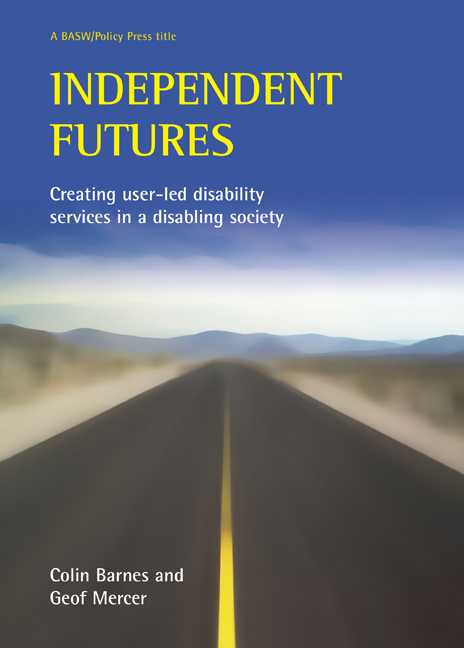Book contents
- Frontmatter
- Contents
- List of figures and tables
- Acknowledgements
- Notes on the authors
- one Examining user-led services
- two Traditional approaches: disability policy and the welfare state
- three Disability activism and the struggle for independent living
- four Researching user-led organisations
- five User-led organisations: building an alternative approach
- six Service design and delivery: opportunities and constraints
- seven Service users’ views and experiences
- eight Politics and campaigning
- nine Policy change or retrenchment?
- ten Future directions
- References
- Index
four - Researching user-led organisations
Published online by Cambridge University Press: 15 January 2022
- Frontmatter
- Contents
- List of figures and tables
- Acknowledgements
- Notes on the authors
- one Examining user-led services
- two Traditional approaches: disability policy and the welfare state
- three Disability activism and the struggle for independent living
- four Researching user-led organisations
- five User-led organisations: building an alternative approach
- six Service design and delivery: opportunities and constraints
- seven Service users’ views and experiences
- eight Politics and campaigning
- nine Policy change or retrenchment?
- ten Future directions
- References
- Index
Summary
Introduction
In the last quarter of the 20th century, the critique of established ways of theorising disability was extended to mainstream social research. The starting point was the refocusing of analyses of disability on the ways in which social barriers rather than individual limitations contributed to the exclusion of disabled people from everyday life. In turn, this socio-political approach stimulated the adoption of a research paradigm that similarly challenged the social oppression of disabled people.
This chapter begins with a review of disability theorists’ criticism of traditional ways of researching disability, particularly its theoretical standpoint and the disempowering role of ‘research experts’. Second, we explore the key features of an alternative approach to doing disability research in line with a social model framework: what has been termed ‘emancipatory disability research’ (Oliver, 1992). This stresses its commitment to the central outcomes of the empowerment of disabled people and political change, while also informing the process of conducting research. However, as explored in the third section, the emphasis on political partiality has often deflected attention away from important debates about the choice of methodology and methods and their implementation when undertaking disability research. The final section describes the Creating Independent Futures project on user-controlled organisations. It covers the overall research strategy and design, including the main data sources, sampling, data collection and dissemination techniques.
Taking issue with ‘conventional’ disability research
In the early 1960s, a group of disabled residents at the Le Court Cheshire Home in Hampshire asked academic researchers at the Tavistock Institute to investigate their living conditions – apparently stimulated by the anticipated benefits of applying social psychological insights to residential living (Miller and Gwynne, 1972, chapter 2). Little did the residents realise how severely their hopes would be dashed.
The trigger for their invitation was a dispute with management that had continued since the late 1950s over residents’ attempts to counter the disempowering effects of institutional living and exercise more control over their lives, such as choosing their own bedtimes and television viewing, whether they should be allowed to drink alcohol, or have open relations between the sexes. While the residents sought to confirm a more liberal regime that involved them in the running of Le Court, this was confounded by changes in senior staff such as the Matron and Secretary (Mason, 1990).
- Type
- Chapter
- Information
- Independent FuturesCreating User-Led Disability Services in a Disabling Society, pp. 51 - 70Publisher: Bristol University PressPrint publication year: 2006



